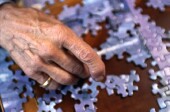 |
 |
 |
||
    |
||||
|
||||

Reading, Games Help Keep Aging Memories Sharp
But too much TV is linked to poorer recall, study finds|
|
HealthDay
By Robert Preidt
Tuesday, February 17, 2009
 TUESDAY, Feb. 17 (HealthDay News) -- Doing brain activities, such as reading or playing games, in middle age and later may help delay or prevent memory loss, according to new research.
TUESDAY, Feb. 17 (HealthDay News) -- Doing brain activities, such as reading or playing games, in middle age and later may help delay or prevent memory loss, according to new research.
The study included 197 people, ages 70 to 89, with mild cognitive impairment or diagnosed memory loss and 1,124 people in the same age group with no memory problems.
All the participants were asked about their daily activities within the past year, as well as when they were between 50 and 65 years old.
Those who read books, played games, used computers, and did crafts such as pottery or quilting in their later years were 30 percent to 50 percent less likely to develop memory loss than people who didn't do these kinds of mental activities. In addition, people who watched television for less than seven hours a day in their later years were 50 percent less likely to develop memory loss than those who watched television for more than seven hours a day.
The study also found that people who took part in social activities and read magazines during middle age were 40 percent less likely to develop memory loss than those who didn't do such activities.
The findings were released Tuesday and were expected to be presented at the annual meeting of the American Academy of Neurology (AAN), in Seattle.
"This study is exciting, because it demonstrates that aging does not need to be a passive process. By simply engaging in cognitive exercise, you can protect against future memory loss," study author Dr. Yonas Geda, a neuropsychiatrist at the Mayo Clinic in Rochester, N.Y., said in an AAN news release.
"Of course, the challenge with this type of research is that we are relying on past memories of the participants, therefore, we need to confirm these findings with additional research," Geda added.
HealthDay
Copyright (c) 2009 ScoutNews, LLC. All rights reserved.
Related News:
More News on this Date
Related MedlinePlus Pages:
| Home | Health Topics | Drugs & Supplements | Encyclopedia | Dictionary | News | Directories | Other Resources | |
| Disclaimers | Copyright | Privacy | Accessibility | Quality Guidelines U.S. National Library of Medicine, 8600 Rockville Pike, Bethesda, MD 20894 National Institutes of Health | Department of Health & Human Services |
Date last updated: 18 February 2009 |
